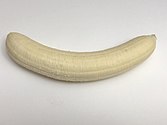The BRAT diet ("Bananas, Rice, Apple sauce, Toast") is a restrictive diet that was once recommended for people, particularly children, with gastrointestinal distress like vomiting, diarrhea, or gastroenteritis. Evidence, however, does not support a benefit.[1] As of the 21st century, it is no longer recommended, as it is unnecessarily restrictive.[1][2] The diet was first discussed in 1926.[1]
An acronym, BRAT stands for bananas, rice, apple sauce, and toast, the four food components of the diet.[1] Additionally, it is recommended[by whom?] that all people, regardless of age, drink plenty of fluids to prevent dehydration, along with oral rehydration solutions to replace the depleted electrolytes and avoid salt imbalance.[3] Severe, untreated salt imbalance can result in "extreme weakness, confusion, coma, or death."[4]
- ^ a b c d Mackell S (1 December 2005). "Traveler's diarrhea in the pediatric population: etiology and impact". Clinical Infectious Diseases. 41 (Suppl 8): S547-52. doi:10.1086/432950. PMID 16267717.
- ^ King CK, Glass R, Bresee JS, Duggan C (November 2003). "Managing acute gastroenteritis among children: oral rehydration, maintenance, and nutritional therapy". MMWR Recomm Rep. 52 (RR-16): 1–16. PMID 14627948.
- ^ Duggan C, Santosham M, Glass RI (16 October 1992). "The management of acute diarrhea in children: oral rehydration, maintenance, and nutritional therapy. Centers for Disease Control and Prevention". MMWR. Recommendations and Reports. 41 (RR-16): 1–20. PMID 1435668.
- ^ McLaughlin E (24 July 2000). "salt imbalance". Archived from the original on 2 July 2007. Retrieved 8 April 2007.



